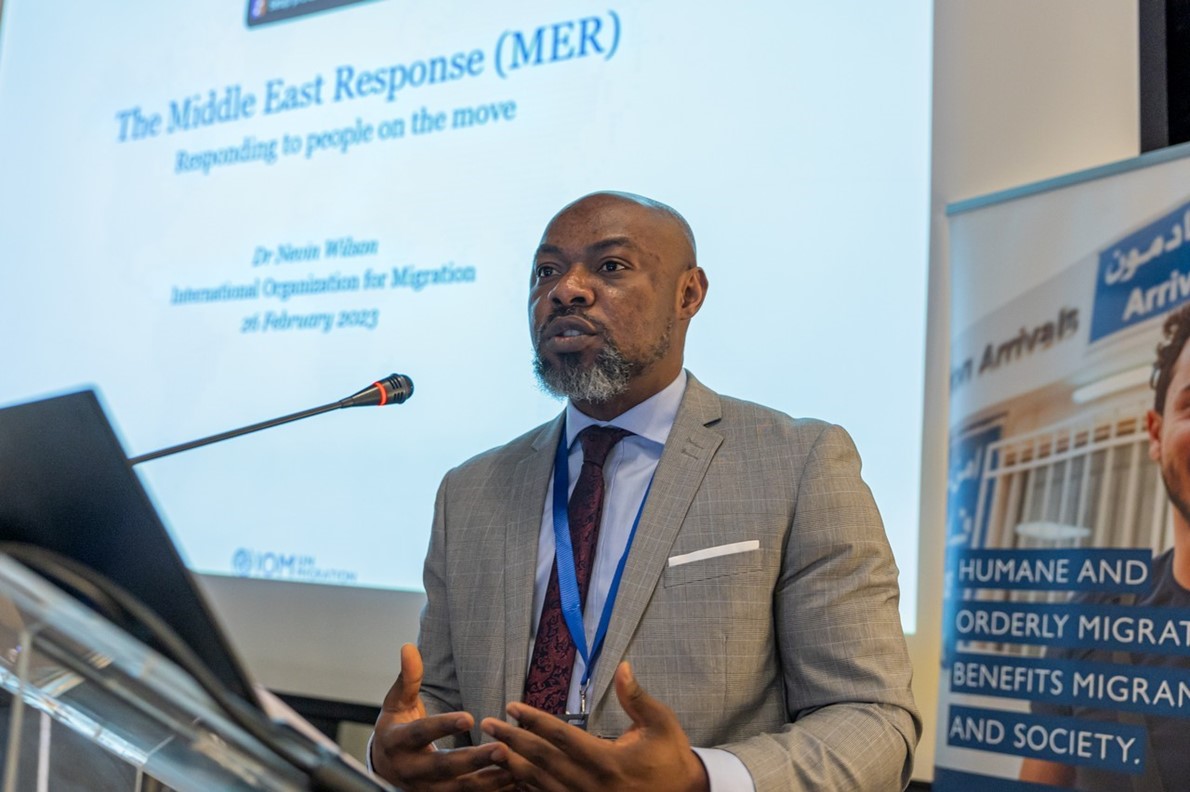Press Release — The
International Organization for Migration
(IOM)’s Middle East Response (MER) as Principal Recipient organized a
high-level regional strategic resource mobilization meeting in Amman on Sunday
and Monday.
اضافة اعلان
The meeting brought together representatives from the Global Fund (GF)
and deputy ministers of health from the public health ministries of Jordan,
Iraq, Syria, Lebanon, Yemen, and the Palestinian Territories, as well as
technical partners, such as WHO, UNAIDS, UNICEF, and members of the GF Local
Fund Agent and Swiss Tropical and Public Health Institute (Swiss TPH),
according to a press statement.
The meeting offered a platform for the health ministry leadership from
the six countries supported by IOM through a GF grant to engage in discussions
on how to effectively utilize resources available through the Middle East
Response to achieve national goals and the thematic elimination goal or agenda
in terms of Tuberculosis (TB), HIV, and Malaria in the Middle East region.
“This high-level meeting of health policymakers from countries covered
through the MER, along with key partners IOM, UNICEF, WHO, and UNAIDS, is the
first in a series of strategic regional leadership discussions and
prioritization of investment to ‘change the game’ and make prevention, control,
and even elimination of the three diseases a real consideration and agenda in
the most challenging operating environment context,” said Emmanuel Olatunji, GF
fund portfolio manager.

The two-day meeting was opened by IOM Jordan’s Chief of Mission Tajma
Kurt. The national program managers of the three disease control programs will
convene later in the week with IOM, WHO, UNAIDS, and the Global Fund to review
the progress of ongoing MER implementation, address bottlenecks, and identify
emerging priorities for the next grant cycle, 2025–2027.
Supporting ‘every resident of Jordan’Dr Jamela Al-Raiby, WHO Representative to Jordan, emphasized the need
to support the national TB and AIDS programs in Jordan, and their efforts
towards prevention, control, and elimination: “WHO provided strong technical
support to the development of the National Strategic Plan towards TB
elimination and the introduction of the District Health Information Software as
a surveillance platform for TB. We remain committed to continue our support for
the benefit of every resident of Jordan”.
“The MER was initially set up as a differentiated response to ensure
that supply lines for drugs and diagnostics for the prevention, diagnosis, and
control of the three diseases were not interrupted due to the humanitarian
crisis in the region,” said Dr Nevin Wilson, IOM’s senior regional project
coordinator leading the MER. “It has evolved and consolidated into a strategic
investment of the Global Fund demonstrating progress against the three diseases
prioritizing the most vulnerable populations through partnerships, innovation,
and collaboration.”
The MER’s regional accomplishments
Since 2017, the GF has invested over $160 million in MER in three
phases, and has further allocated $54 million for a fourth phase (2025–2027),
bringing the total investment in MER to $215 million. The GF commitments
include fighting against the spread of the three diseases in the region, as
well as mitigating the effects of the COVID-19 pandemic.
Between 2017 and 2022, the MER notified 104,120 patients with
drug-sensitive tuberculosis and 943 patients with drug-resistant tuberculosis.
Cumulatively, 6,132 people living with HIV receive antiretroviral therapy
through the MER and 218,010 people were able to access voluntary counselling
and testing to ascertain their HIV status.
A total of 5,269,738 long-lasting insecticide-treated mosquito nets
were distributed to the most at-risk populations in Yemen, thereby protecting
more than 10 million people from malaria. The fund significantly supports
building a Resilient, Sustainable System for Health though providing mobile
vans, X-ray machines, GeneXpert machines, and other medical equipment.
Civil society organizations are also involved in the implementation of
MER grants and continue to offer a catalytic effect to the biomedical
interventions related to the three diseases.
Disclaimer:
This press release is not produced by Jordan News. We do not bear responsibility for its content. In case you have any questions about this press release, please refer to the contact person/entity mentioned in the body of the text.
Read more National news
Jordan News




